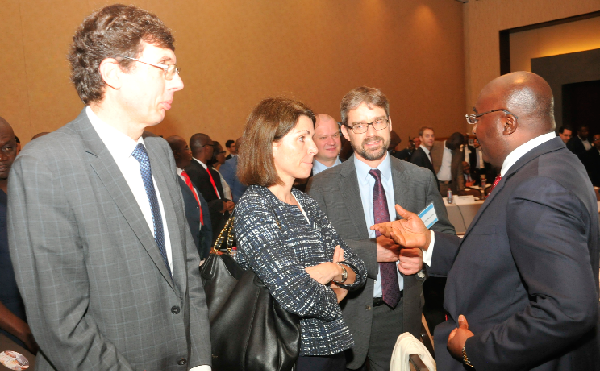The government has begun discussions with mining companies in Ghana, especially those engaged in the mining of gold, to ensure that the country derives the maximum revenue from the exploitation of natural resources.
The Vice-President, Dr Mahamudu Bawumia, who said this at the ongoing Regional Conference on “Fiscal management of mining and petroleum resources in West Africa” in Accra, observed that the improper accounting for extractive resources by concessionaires had been a major source of revenue loss in Africa, with significant negative fiscal implications.
“No fiscal management system of mining and oil revenues can be robust without including measures aimed at properly accounting for the resources extracted," he emphasised.
The conference is being hosted by the Africa and the Fiscal Affairs departments of the International Monetary Fund (IMF), with participants drawn from Ghana, Nigeria, Senegal, Sierra Leone, Niger, Mali and Mauritania, as well as senior officials of the IMF.
Proper accounting
Dr Bawumia said it was improper for major gold mining companies to assay the gold they mined before it was exported, since the law empowered the Precious Minerals Marketing Company (PMMC) to do so.
“Thankfully, we have now begun conversations on the process of making sure that every single bar of gold leaving our shores is properly weighed, tested, valued and accounted for.
“While the process may not be as robust as we want, it is a positive step in the right direction and we are impressed with the collaboration between the Ghana Chamber of Mines and the PMMC in making sure we expedite the full spectrum of accounting for our gold resources,” he said.
Negative factors
Dr Bawumia urged the participants to deliberate on areas militating against resource-rich countries, including revenue leakages by means of improper accounting for resources, the locking out of resource-rich countries from the high-value ends of value chains, limited local content and the lack of full participation of local businesses in resource industries and growing revelations of illicit financial flows through ‘external accounts’ and mis-pricing of trade transactions, indicating that they went a long way to deprive ordinary citizens of the full benefits of their natural resources.
“I would also like you to consider, during your deliberations, the difference between contracts in the oil and the mining sectors. In the oil sector, for example, for 100 barrels of oil drilled, per the contract, we know what Ghana’s share is. This is not the case for 100 tonnes of gold mined. Why should there be such a difference?” the Vice-President quizzed.
IMF representative
The Deputy Managing Director of the IMF, Ms Carla Grasso, in an address, explained that fiscal management required effective collaboration and information sharing among different government institutions.
“No one institution can, by itself, achieve sound fiscal management of the mining and petroleum sectors. This requires the Ministry of Finance, the revenue authorities, the Mining and the Petroleum ministries and the regulatory agencies to work together in terms of both policy design and implementation,” she said.
She, however, maintained that there were no simple answers on how to escape the resource curse in the extractive sector, although countries that had derived sustained benefits from natural resources had one common factor — sound fiscal management.
PMMC mandate
Presently, the PMMC, the outfit mandated by the law to assay all mineral resources exported from the country, has begun acquiring the necessary equipment to undertake that duty.
The Managing Director of the PMMC, Dr Kwadjo Opare-Hammond, in an interview with the Daily Graphic on the sidelines of the conference, explained that the PMMC had begun an exercise that would ensure that gold produced by large-scale miners in the country was graded, valued and tested to determine its ingredients and quality before being allowed to be exported.
“We have, from January, begun assaying the gold and so far the companies are complying with us and so it has started already and what the government seeks to do is to maximise the country’s gain from the sector,” he said.
